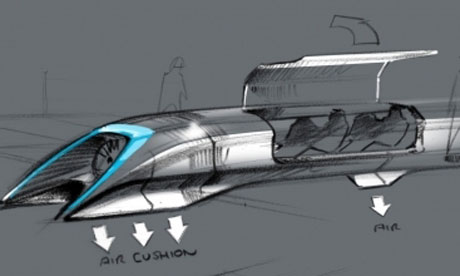 |
| Elon Musk unveiled plans for the Hyperloop in a 57-page PDF |
What indeed is left of the notion of service when you are auto-matically controlled? Similarly, what is left of the notion of public when the (real-time) public image prevails over public space?
Already the notion of public transport is gradually giving way to the idea of a transit corridor, the continuous prevailing over the discontinuous. What can one say about the wired household of electronic domesticity, with houses that have computers wired into them, controlling the house systems, or of the smart building, indeed the intelligent and interactive city such as Kawasaki? The crisis in the notion of physical dimensions thus hits politics and the administration of public services head on in attacking what was once geopolitics.
If the classic interval is giving way to the interface, politics in turn is shifting within exclusively present time. The question is then no longer one of the global versus the local, or of the transnational versus the national. It is, first and foremost, a question of the sudden temporal switch in which not only inside and outside disappear, the expanse of the political territory, but also the before and after of its duration, of its history; all that remains is a real instant over which, in the end, no one has any control. For proof of this, one need look no further than the inextricable mess geostrategy is in thanks to the impossibility of clearly distinguishing now between offensive and defensive—instantaneous, multipolar strategy now being deployed in 'preemptive' strikes, as they say in the military.
And so the age-old tyranny of distance between beings geographically distributed in different places is gradually yielding to the tyranny of real time which is not the exclusive concern of travel agents, as optimists claim, but a special concern of the employment agency, since the greater the speed of exchanges, the more unemployment spreads and becomes mass unemployment.
Redundancy of man's muscular strength in favour of the 'machine tool' from the nineteenth century on. Now redundancy, permanent unemployment, of his memory and his conciousness, with the recent boom in computers, in 'transfer machines', and the automation of postindustrial production combining with the automation of perception, and finally with computer-aided design, enabled by the software market, ahead of the coming of the artificial intelligence market."
Paul Virlio - Open Sky
No comments:
Post a Comment